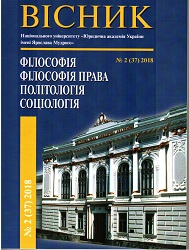ДЕМОКРАТИЧНІ ПРИНЦИПИ В ОСВІТНЬОМУ ПРОЦЕСІ: ПОЛІТИКО-КУЛЬТУРНИЙ КОНТЕКСТ
DEMOCRATIC PRINCIPLES IN THE EDUCATIONAL PROCESS: POLITICAL AND CULTURAL CONTEXT
Author(s): Halyna Mykhaylivna KutsSubject(s): Education, Political Theory
Published by: Національний юридичний університет імені Ярослава Мудрого
Keywords: democracy; education; political culture; democratic values; critical thinking; «Reggio-pedagogy»;
Summary/Abstract: Problem setting. The end of the twentieth century was marked by focusing the attention of many theorists on the problems of democratization, which in particular was connected with the collapse of the socialist system and the emergence of new countries on the world stage, for which the problems of democratic transformations became relevant. In the process of transition from undemocratic (different types of autocracies) to democratic modes, there are overwhelmingly two phases: liberalization and democratization. However, the implementation of liberalization and democratization does not guarantee the transformation of the undemocratic regime into a democratic one, since there is always a danger of reversal. After all, in addition to the institutional component, which is a very important guarantor of the success in the democratization processes, the value component of a particular culture plays an important role. Recent research and publications analysis. At the beginning of the twenty-first century in the western political discourse a series of trends took place in the context of which liberal-democratic processes of the present day are analyzed (L. Diamond, R. Dahl, T. Carothers, A. Przeworski,D. Rustow, S. Huntington, F. Schmitter, etc.). Prioritization in the analysis of democratization processes is given to institutional transformations. At the same time, institutions are capable of transforming political life only if they are correlated with the socio-cultural environment (L. Harrison). Paper objective. The purpose of the article is to identify priority educational strategies for the democratization of democratic principles in the mass consciousness of Ukrainian citizens. Paper main body. The implantation of democratic values involves the formation of specific educational strategies aimed at shaping critical thinking. This requires radically new approaches to the formation of educational programs that in the era of information technology dominance should be aimed at the development of critical thinking, social interaction skills, communication skills, creativity, the ability to find non-standard solutions in solving problems, etc.The attention is focused on the basic ideas of «Reggio-Pedagogy», aimed at developing children’s independent thinking and skills of independent activity. It is noted that the basic propositions of «Reggio-pedagogics» correlate in a certain way with the concept of the «school of heart» of V. O. Sukhomlynsky (Ukrainian educational discourse). Conclusions of the research. The necessity of interiorization of democratic principles in the mass consciousness of Ukrainian citizens is emphasized, which involves activization of educational strategies. It is noted that the paradigm of education, in the context of which the implementation of democratic standards would be the most optimal, correlates with the concept of the formation of critical thinking. Focus is on the basic postulates of «Reggio-Pedagogy», where education is considered to be a meeting place for the growth of freedom, democracy and solidarity.
Journal: Вісник НЮУ імені Ярослава Мудрого. Серія: Філософія, філософія права, політологія, соціологія
- Issue Year: 37/2018
- Issue No: 2
- Page Range: 46-56
- Page Count: 11
- Language: Ukrainian

